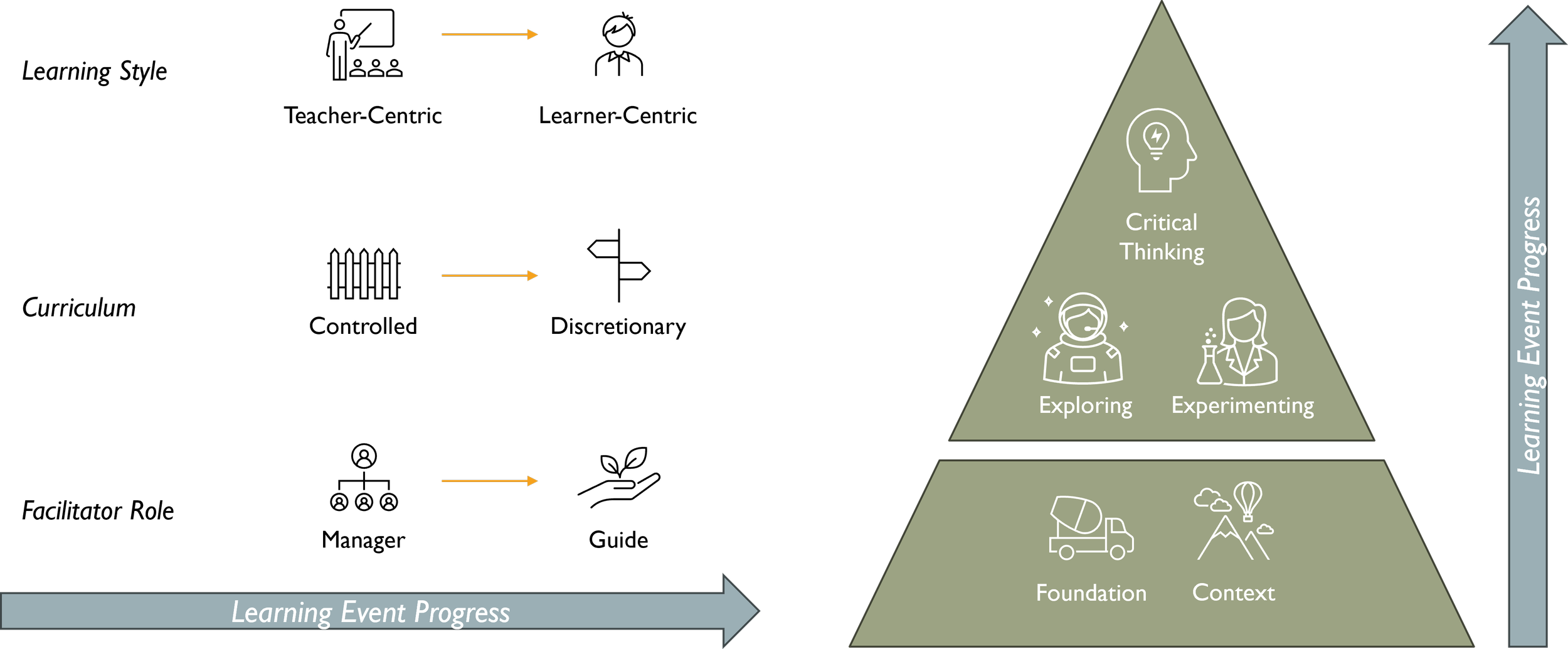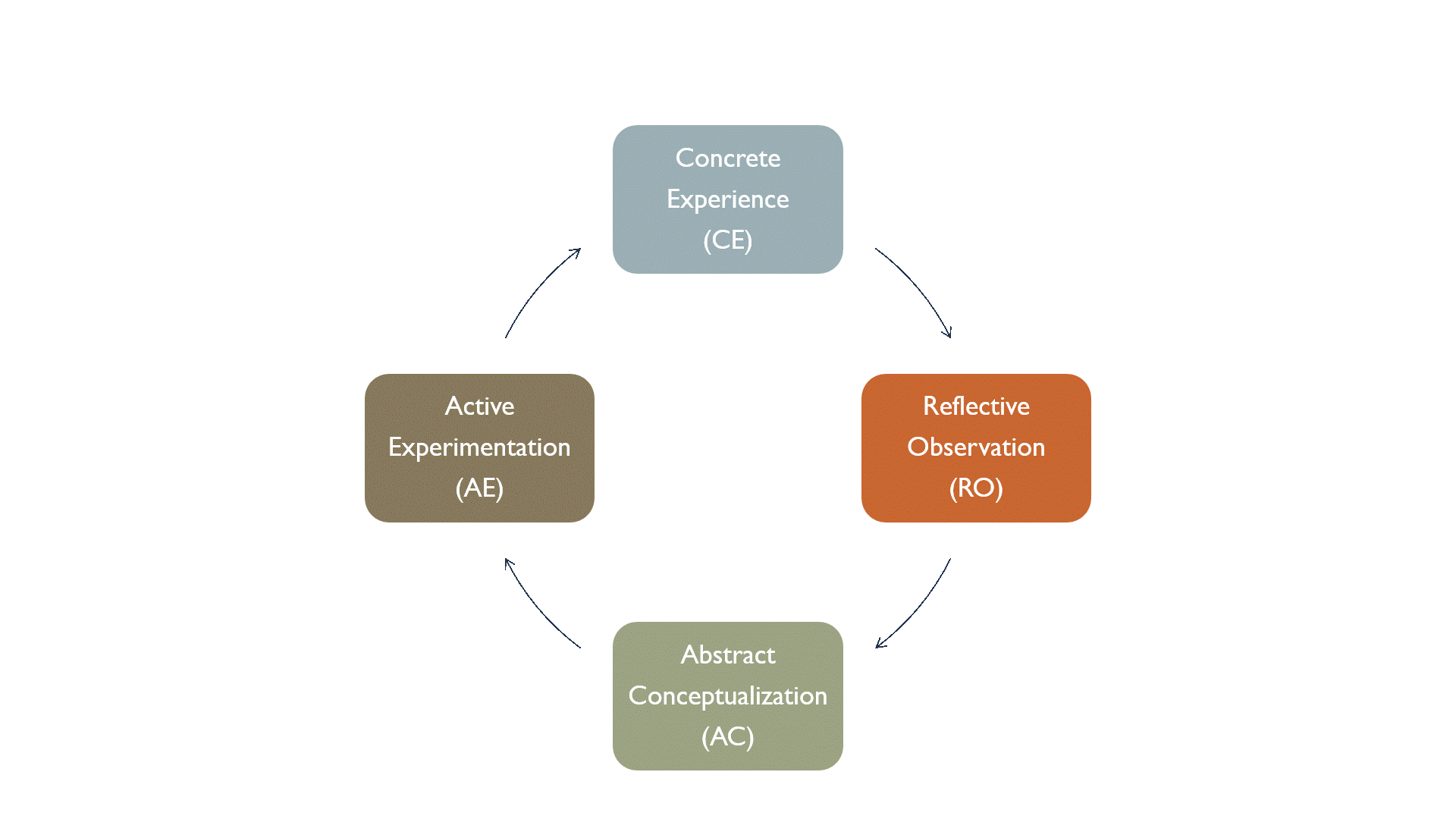Foundation
This section covers the foundational elements that impact my approach to adult learning.
Teaching Philosophy
A teaching philosophy is a statement or document that describes your values and approach to adult learning as an educator.
Why is it important?
Defines your preferred approach to adult learning
Serves as a reminder when you are facing challenges
Shareable resource that reflects your educational values
The foremost benefit is that you now have an organizing vision for your practice. With such a vision, it gives you a sense of stability and direction and a greater understanding of self in relation to the decisions and practices you employ in the classroom, training session, workshop or seminar. It serves as a foundation for critically thinking about your practice, ideas and the political and social structure dimensions (Galbraith, 2000, p.13).
My Philosophy
I prefer to start a learning program by providing background and contextual knowledge to lay the foundation for the learner.
At the start of a program, my role as an educator should be hands-on like a manager, the learning style should be slanted to be more teacher-centric, and the curriculum should be closely controlled with specific assignments and activities.
Many times students need a base level of knowledge or background information before group work, critical thinking, problem solving, or other ways of learning can be attempted. (Davis & Arend, 2013, p.72).
My Philosophy (continued)
As the learning event progresses:
the learning style will shift to be more learner-centric
the learners will become more confident with the material and will be given the opportunity to explore the topic with less restrictive activities, such as group projects and self-directed learning.
my role will evolve from being a manager to providing guidance
Throughout the event, it is important to create and support a collaborative environment
providing engaging learning activities fosters positive relationships among the learners and in turn assists with learning
learners gain valuable knowledge by being exposed to multiple points of view
Click to enlarge
Comprehensive Learning Theory
Knud Illeris’ (2003) Comprehensive Learning Theory attempts to address all factors involved in learning, including making note of the interaction between the learning elements. The backbone to his theory is the three dimensions of learning, which he identifies as content, incentive, and interaction.
Why is it important?
Identifies the significance of the incentive and interaction dimensions, which are often overlooked in other theories (Illeris, 2012)
Notes the importance of interaction with external environments (physical, social, and cultural)
Personal Perspective
What draws me to Illeris’ comprehensive learning theory is that it takes into consideration the balance of content, incentive, and interaction that make up the learning process. Furthermore, I appreciate how he believes that the learning process begins with an external interaction with the learners’ environment and then follows with individual internal processes.
However, I find the diagram of his model challenging, especially for those who have not followed his work closely. Thus, I have created a different version that provides more detail about the dimensions as well as the external and internal processes involved. I believe that this diagram provides a more intuitive directional flow by demonstrating how the interaction dimension is the trigger point for the beginning of the learning process. Additionally, it incorporates the secondary interaction of the individual back to their environment.
Work Sample:
Illeris’ Model
(Illeris, 2007, p.88)
My Interpretation
Click to enlarge
(Illeris, 2003, 2004, 2007)
Experiential Learning Theory
Kolb and Kolb’s Experiential Learning Theory (2017) “…is a dynamic, holistic theory of the process of learning from experience and a multi-dimensional model of adult development” (p.11). A key component of this theory is the Experiential Learning Cycle.
Why is it important?
Provides a comprehensive picture of how an experience has impact on a learner
Acknowledges the importance of the modes beyond the actual experience
Kolb and Kolb’s work has been the cornerstone of experiential learning
Personal Perspective
Understanding that the experience is just the tip of the iceberg and that critical elements of learning occur after the experience was a transformational shift for me. I gained a newfound appreciation for reflection-based activities and how useful they are in the learning cycle (see the Reflection section on the Deliver page).
After contemplating the Experiential Learning Cycle and considering my teaching philosophy, I have an addition that I have incorporated into the model. Prior to the experience, I believe it is important to provide the learners with background and/or contextual information, which in turn could enhance experience. This is optional as in certain circumstances, it is beneficial for the experience to be a surprise. However, I think it is worth noting in the cycle because it emphasizes the importance of foundational information.
(Kolb & Kolb, 2017, p. 11)
Co-Constructed Developmental Teaching Theory
Schenck & Cruikshank (2015) developed this theory because they felt that Kolb’s model has not been adjusted to incorporate modern research. They believe that topics such as epistemology and neuroscience should be inputs into an experiential learning theory.
Why is it important?
Expands work done from Kolb and Kolb by incorporating research from neuroscience and psychology, in addition to education (Schenck & Cruikshank, 2015).
Includes a framing stage where the educator prepares the learners (consciously or unconsciously).
Incorporates a pause to allow the learners a chance to absorb the experience.
Personal Perspective
I was particularly drawn to the framing and pause portions of this model. Although Schenck & Cruickshank envision the framing in psychological terms, I also draw parallels between this phase and my philosophical approach of providing background and context, similar to the way I added a mode to Kolb and Kolb’s experiential learning cycle. The pause phase aligns with my stance on the importance of reflection.
(Schenck & Cruikshank, 2015, p.84 )
Adult Learner Considerations
Stephen Lieb (1991, p.1) identified 6 characteristics of adult learners that I find useful to consider:
Adults are autonomous and self-directed.
Adults have accumulated a foundation of life experience and knowledge.
Adults are goal oriented.
Adults are relevancy oriented.
Adults are practical, focusing on the aspects of a lesson most useful to them in their work.
Adults need to be shown respect.
Certainly, there are exceptions to the above points and I do not identify these characteristics as absolute, but they are good to keep in mind when planning and conducting learning events for adults.
Wlodkowski and Ginsberg (2017) developed a motivational framework as a guide to help educators and learners. Below are the four conditions of their framework with my interpretation of each and why they are important.
Why is it important?
The context of why an adult is engaged in a learning program is an important factor to understand.
The student may be taking a course about a hobby they love and thus will have high motivation to participate and engage.
On the other hand, the student may be enrolled in a specific course as a work requirement (for example), and they may not be very excited to participate.
Establishing Inclusion is getting the learners involved to build a sense of community with each other and with the educator and fostering mutual respect. This is important for motivation because it creates an atmosphere that is conducive to learning: learners are excited to learn and work with people who are also interested in the same topic, it challenges them to think deeply about the subject, and have a constructive exchange of ideas.
Developing Attitude is creating a positive view of the education event through a personal connection. This is important because curiosity about the topic emerges from a positive attitude. A learner with a positive attitude is interested and engaged in the learning process.
Enhancing Meaning is building on the learner's experience to learn new things that relate to the learner. This is important because it provides the learner stepping stones to learn more complex concepts. It is taking the prior meaning (experiences) and enhancing it with new, richer material.
Engendering Competence is ensuring that a learner knows that they are more effective in learning something that is important to them. This is important because it is the entrance into a positive back and forth between competence and confidence. A learner strives for competence and in the (learning) process becomes more confident about their knowledge and abilities. That in turn provides the learner with more competence in the subject, and the upward cycle continues.




